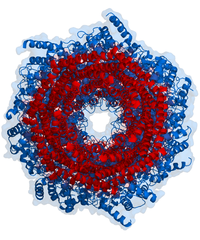
Photo from wikipedia
Autophagy is a major degradation pathway that utilizes lysosome hydrolases to degrade cellular constituents and is often induced under cellular stress conditions to restore cell homeostasis. Another prime degradation pathway… Click to show full abstract
Autophagy is a major degradation pathway that utilizes lysosome hydrolases to degrade cellular constituents and is often induced under cellular stress conditions to restore cell homeostasis. Another prime degradation pathway in the cells is ubiquitin-proteasome system (UPS), in which proteins tagged by certain types of polyubiquitin chains are selectively recognized and removed by proteasome. Although the two degradation pathways are operated independently with different sets of players, recent studies have revealed reciprocal cross talks between UPS and autophagy at multiple layers. In this review, we summarize the roles of protein ubiquitination and deubiquitination in controlling the initiation, execution, and termination of bulk autophagy as well as the role of ubiquitination in signaling certain types of selective autophagy. We also highlight how dysregulation of ubiquitin-mediated autophagy pathways is associated with a number of human diseases and the potential of targeting these pathways for disease intervention.
Journal Title: Journal of Biomedical Science
Year Published: 2019
Link to full text (if available)
Share on Social Media: Sign Up to like & get
recommendations!